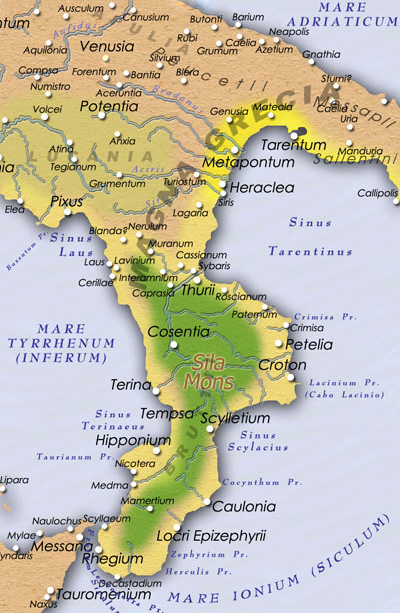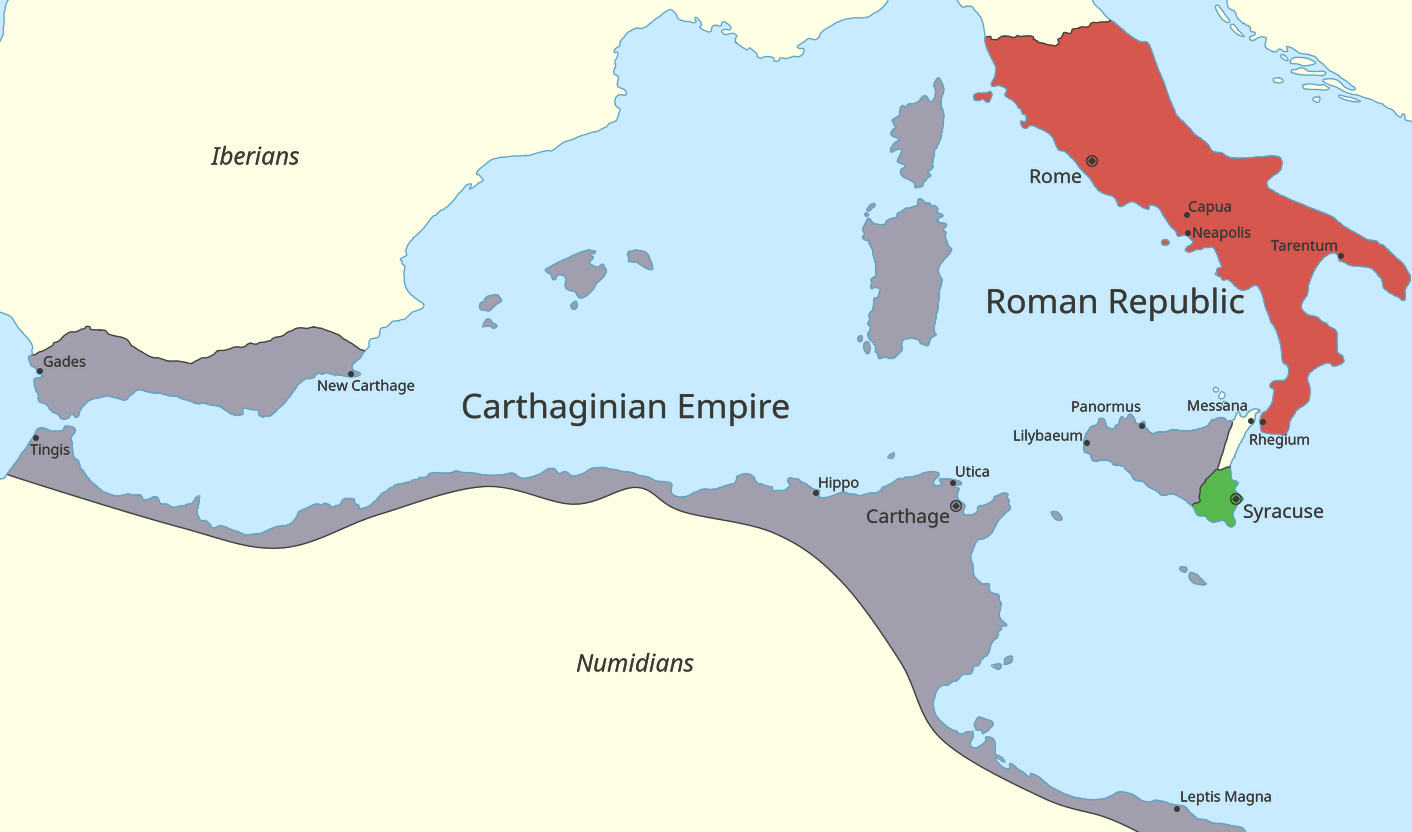|
Quintus Caecilius Metellus (consul 206 BC)
Quintus Caecilius Metellus (c. 250 BC – 175 BC) was a pontiff in 216 BC, aedile of the plebeians in 209 BC, curule aedile in 208 BC, magister equitum in 207 BC, consul in 206 BC, dictator in 205 BC, proconsul of Bruttium in 204 BC, and an ambassador at the court of Philip V of Macedon in 185 BC. He served as a legate in the army of Gaius Claudius Nero and fought in the war against Hannibal. He was also distinguished as an orator, the funeral sermon he pronounced at his father's funeral being counted amount his best speeches. He was the father of Quintus Caecilius Metellus Macedonicus and Lucius Caecilius Metellus Calvus. Family Background Quintus Caecilius Metellus was the son of Lucius Caecilius Metellus, a successful general who defeated Hasdrubal at Panormus in the First Punic War. Both father and son were members of the famed gens Caecilia, a powerful plebeian family of the late Republic. Early career Caecilius Metellus first appears in the historical record in 221 ... [...More Info...] [...Related Items...] OR: [Wikipedia] [Google] [Baidu] |
Denarius
The denarius (, dēnāriī ) was the standard Roman silver coin from its introduction in the Second Punic War to the reign of Gordian III (AD 238–244), when it was gradually replaced by the antoninianus. It continued to be minted in very small quantities, likely for ceremonial purposes, until and through the Tetrarchy (293–313). The word ''dēnārius'' is derived from the Latin ''dēnī'' "containing ten", as its value was originally of 10 assēs.Its value was increased to 16 assēs in the middle of the 2nd century BC. The word for "money" descends from it in Italian (''denaro''), Slovene (''denar''), Portuguese (''dinheiro''), and Spanish (''dinero''). Its name also survives in the dinar currency. Its symbol is represented in Unicode as 𐆖 (U+10196), a numeral monogram that appeared on the obverse in the Republican period, denoting the 10 asses ("X") to 1 denarius ("I") conversion rate. However it can also be represented as X̶ (capital letter X with combining long ... [...More Info...] [...Related Items...] OR: [Wikipedia] [Google] [Baidu] |
Plebeians
In ancient Rome, the plebeians (also called plebs) were the general body of free Roman citizens who were not patricians, as determined by the census, or in other words " commoners". Both classes were hereditary. Etymology The precise origins of the group and the term are unclear, but may be related to the Greek, ''plēthos'', meaning masses. In Latin, the word is a singular collective noun, and its genitive is . Plebeians were not a monolithic social class. Those who resided in the city and were part of the four urban tribes are sometimes called the , while those who lived in the country and were part of the 31 smaller rural tribes are sometimes differentiated by using the label . (List of Roman tribes) In ancient Rome In the annalistic tradition of Livy and Dionysius, the distinction between patricians and plebeians was as old as Rome itself, instituted by Romulus' appointment of the first hundred senators, whose descendants became the patriciate. Modern hypotheses date ... [...More Info...] [...Related Items...] OR: [Wikipedia] [Google] [Baidu] |
Roman Senate
The Roman Senate ( la, Senātus Rōmānus) was a governing and advisory assembly in ancient Rome. It was one of the most enduring institutions in Roman history, being established in the first days of the city of Rome (traditionally founded in 753 BC). It survived the overthrow of the Roman monarchy in 509 BC; the fall of the Roman Republic in the 1st century BC; the division of the Roman Empire in AD 395; and the fall of the Western Roman Empire in 476; Justinian's attempted reconquest of the west in the 6th century, and lasted well into the Eastern Roman Empire's history. During the days of the Roman Kingdom, most of the time the Senate was little more than an advisory council to the king, but it also elected new Roman kings. The last king of Rome, Lucius Tarquinius Superbus, was overthrown following a coup d'état led by Lucius Junius Brutus, who founded the Roman Republic. During the early Republic, the Senate was politically weak, while the various executive magistr ... [...More Info...] [...Related Items...] OR: [Wikipedia] [Google] [Baidu] |
Panegyric
A panegyric ( or ) is a formal public speech or written verse, delivered in high praise of a person or thing. The original panegyrics were speeches delivered at public events in ancient Athens. Etymology The word originated as a compound of grc, παν- 'all' (the form taken by the word πᾶν, neuter of πᾶς 'all', when that is used as a prefix) and the word grc, ἄγυρις, ágyris 'assembly' (an Aeolic dialect form, corresponding to the Attic or Ionic form grc, ἀγορά, agorá). Compounded, these gave grc, πανήγυρις, panḗgyris 'general or national assembly, especially a festival in honour of a god' and the derived adjective grc, πανηγυρικός, panēgyrikós 'of or for a public assembly or festival'. In Hellenistic Greek the noun came also to mean 'a festal oration, laudatory speech', and the adjective 'of or relating to a eulogy, flattering'. The noun grc, πανήγυρις, panḗgyris had been borrowed into Classical Latin by around the ... [...More Info...] [...Related Items...] OR: [Wikipedia] [Google] [Baidu] |
Plebeians
In ancient Rome, the plebeians (also called plebs) were the general body of free Roman citizens who were not patricians, as determined by the census, or in other words " commoners". Both classes were hereditary. Etymology The precise origins of the group and the term are unclear, but may be related to the Greek, ''plēthos'', meaning masses. In Latin, the word is a singular collective noun, and its genitive is . Plebeians were not a monolithic social class. Those who resided in the city and were part of the four urban tribes are sometimes called the , while those who lived in the country and were part of the 31 smaller rural tribes are sometimes differentiated by using the label . (List of Roman tribes) In ancient Rome In the annalistic tradition of Livy and Dionysius, the distinction between patricians and plebeians was as old as Rome itself, instituted by Romulus' appointment of the first hundred senators, whose descendants became the patriciate. Modern hypotheses date ... [...More Info...] [...Related Items...] OR: [Wikipedia] [Google] [Baidu] |
Caecilia Gens
The gens Caecilia was a plebeian family at ancient Rome. Members of this gens are mentioned in history as early as the fifth century BC, but the first of the Caecilii who obtained the consulship was Lucius Caecilius Metellus Denter, in 284 BC.''Dictionary of Greek and Roman Biography and Mythology'', vol. I, p. 526 ("Caecilia Gens"). The Caecilii Metelli were one of the most powerful families of the late Republic, from the decades before the First Punic War down to the time of Augustus. Origin Like other Roman families in the later times of the Republic, the Caecilii traced their origin to a mythical personage, Caeculus, the founder of Praeneste. He was said to be the son of Vulcan, and engendered by a spark; a similar story was told of Servius Tullius. He was exposed as an infant, but preserved by his divine father, and raised by maidens. He grew up amongst the shepherds, and became a highwayman. Coming of age, he called upon the people of the countryside to build a new town, ... [...More Info...] [...Related Items...] OR: [Wikipedia] [Google] [Baidu] |
Hasdrubal, Son Of Hanno
Hasdrubal ( 255250 BC) was a Carthaginian general who served during the middle years of the First Punic War, fought between Carthage and Rome, and took a leading part in three of the four major field battles of the war. He was a citizen of the city state of Carthage, which was in what is now Tunisia. His date of birth and age at death are both unknown, as are his activities prior to his coming to prominence in 255 BC. Modern historians distinguish him from other Carthaginians named Hasdrubal by the cognomen "son of Hanno". Hasdrubal was one of three Carthaginian generals, possibly the senior, who took command of the army raised when the Romans invaded North Africa in 255 BC. He was responsible for the decision to march against the Romans late in the year and was present at the Battle of Adys where the Carthaginians were routed. Early in 254 BC the triumvirate of Carthaginian generals gave control of the army to the Spartan mercenary commander, Xanthippus, an ... [...More Info...] [...Related Items...] OR: [Wikipedia] [Google] [Baidu] |
Orator
An orator, or oratist, is a public speaker, especially one who is eloquent or skilled. Etymology Recorded in English c. 1374, with a meaning of "one who pleads or argues for a cause", from Anglo-French ''oratour'', Old French ''orateur'' (14th century), Latin ''orator'' ("speaker"), from ''orare'' ("speak before a court or assembly; plead"), derived from a Proto-Indo-European base *''or-'' ("to pronounce a ritual formula"). The modern meaning of the word, "public speaker", is attested from c. 1430. History In ancient Rome, the art of speaking in public (''Ars Oratoria'') was a professional competence especially cultivated by politicians and lawyers. As the Greeks were still seen as the masters in this field, as in philosophy and most sciences, the leading Roman families often either sent their sons to study these things under a famous master in Greece (as was the case with the young Julius Caesar), or engaged a Greek teacher (under pay or as a slave). In the young revolutionar ... [...More Info...] [...Related Items...] OR: [Wikipedia] [Google] [Baidu] |
Hannibal
Hannibal (; xpu, 𐤇𐤍𐤁𐤏𐤋, ''Ḥannibaʿl''; 247 – between 183 and 181 BC) was a Carthaginian general and statesman who commanded the forces of Carthage in their battle against the Roman Republic during the Second Punic War. He is widely regarded as one of the greatest military commanders in history. Hannibal's father, Hamilcar Barca, was a leading Carthaginian general during the First Punic War. His younger brothers were Mago and Hasdrubal; his brother-in-law was Hasdrubal the Fair, who commanded other Carthaginian armies. Hannibal lived during a period of great tension in the Mediterranean Basin, triggered by the emergence of the Roman Republic as a great power with its defeat of Carthage in the First Punic War. Revanchism prevailed in Carthage, symbolized by the pledge that Hannibal made to his father to "never be a friend of Rome". In 218 BC, Hannibal attacked Saguntum (modern Sagunto, Spain), an ally of Rome, in Hispania, sparking the Second Pun ... [...More Info...] [...Related Items...] OR: [Wikipedia] [Google] [Baidu] |
Gaius Claudius Nero
Gaius Claudius Nero (c. 247 BCc. 189 BC) was a Roman general active during the Second Punic War against the invading Carthaginian force, led by Hannibal Barca. During a military career that began as legate in 214 BC, he was propraetor in 211 BC during the siege of Capua, before being sent to Spain that same year. He became consul in 207 BC. He is most renowned for his part in the Battle of the Metaurus, fought alongside his co-consul and great rival Marcus Livius Salinator against Hannibal's brother Hasdrubal, for which he was awarded an ovation. The Roman victory at Metaurus River in 207 BC is widely seen as a daring strategic masterstroke by Claudius who surreptitiously left the main force of his army, which was holding Hannibal at bay in the south of Italy, to lead a small contingent of troops north to bolster Livius' forces, taking Hasdrubal by surprise. Considered by the Roman historian Livy to be the turning point in the war, the Battle of the Metaurus is listed in Sir Edwa ... [...More Info...] [...Related Items...] OR: [Wikipedia] [Google] [Baidu] |
Legatus
A ''legatus'' (; anglicised as legate) was a high-ranking Roman military officer in the Roman Army, equivalent to a modern high-ranking general officer. Initially used to delegate power, the term became formalised under Augustus as the officer in command of a legion. From the times of the Roman Republic, legates received large shares of the military's rewards at the end of a successful campaign. This made the position a lucrative one, so it could often attract even distinguished consuls or other high-ranking political figures within Roman politics (e.g., the consul Lucius Julius Caesar volunteered late in the Gallic Wars as a legate under his first cousin, Gaius Julius Caesar). History Roman Republic The rank of legatus existed as early as the Samnite Wars, but it was not until 190 BC that it started to be standardized, meant to better manage the higher numbers of soldiers the Second Punic War had forced to recruit. The legatus of a Roman Republican army was essentially a sup ... [...More Info...] [...Related Items...] OR: [Wikipedia] [Google] [Baidu] |
Philip V Of Macedon
Philip V ( grc-gre, Φίλιππος ; 238–179 BC) was king ( Basileus) of Macedonia from 221 to 179 BC. Philip's reign was principally marked by an unsuccessful struggle with the emerging power of the Roman Republic. He would lead Macedon against Rome in the First and Second Macedonian Wars, losing the latter but allying with Rome in the Roman-Seleucid War towards the end of his reign. Early life Philip was the son of Demetrius II of Macedon and Chryseis. Philip was nine years old when his father died 229 BC. His elder paternal half sister was Apama III. Philips's great-uncle, Antigonus III Doson, administered the kingdom as regent until his death in 221 BC when Philip was seventeen years old. Philip was attractive and charismatic as a young man. A dashing and courageous warrior, he was compared to Alexander the Great and was nicknamed ''beloved of the Hellenes'' () because he became, as Polybius put it, "...the beloved of the Hellenes for his charitable inclination". A ... [...More Info...] [...Related Items...] OR: [Wikipedia] [Google] [Baidu] |








